Social
Social Sustainability
BCH places great importance on conducting business ethically, transparently, and reliably under the principles of good corporate governance and respect for human rights. It is committed to treating all stakeholders fairly while considering the impacts on surrounding communities. The Company focuses on equitable human resource management, strictly prohibits child labor and forced labor, promotes fair employment practices, develops medical services to meet international standards, and safeguards personal data. Additionally, it supports initiatives that enhance community quality of life and complies with safety, hygiene, and environmental standards to foster sustainable growth in harmony with society.
Social Sustainability Management Goals
Social Dimension
Goals
- Average employees' training hours are at least 6 hours per person.
- Employee engagement score is not less than 70%.
- Employees are informed of the human rights policy through dissemination on the website and various activities, to achieve 100% awareness by 2025.
Social Dimension
Goals
Expand hospitals in Thailand under the Kasemrad Hospital brand to ensure that people have widespread access to medical services meeting high standards.
Social Dimension
Goals
The rate of work-related fatal accidents is zero.
Social Dimension
Goals
Employees are informed of the human rights policy through dissemination on the website and various activities, to achieve 100% awareness by 2025.
Social Dimension
Goals
All affiliated hospitals conduct at least 100 social activities annually.
Organization and employee development
Employees are valuable resources and play a crucial role in the organization’s sustainable success. Achieving the organization’s vision, mission, and goals requires knowledgeable, skilled, and efficient employees. Therefore, the Company places great importance on continuously developing employees’ capabilities to adapt to changes and appropriately meet stakeholder needs. Key training courses provided include “MINI MBA INNOVATEMED: SUSTAINABLE HEALTHCARE MANAGEMENT,” Advanced Cardiac Life Support (ACLS) for medical personnel, Infection Prevention and Control for inpatients, and the Personal Data Protection Act (PDPA) course, all aimed at enhancing patient care standards and service quality in all aspects.
Goals
The average employee's training hours are at least
6 hours per person
Total Training Hours of Full-time Employees
(excluding physicians)
118,176 Hours
Average hours of training
15.70 Hours

Overview of Human Resource Management in 2024
Employees are regarded as valuable resources that play a vital role in BCH’s long-term success. Driving the organization towards its vision and mission requires personnel with knowledge, skills, and effective performance. BCH therefore places great importance on the continuous development of human resources, alongside fostering a work environment that supports growth and employee engagement. In addition, BCH is committed to supporting the local economy by prioritizing the employment of personnel from the communities where its hospitals are located, thereby creating job opportunities, enhancing income, and improving quality of life to grow sustainably together with the organization.
Total Employees
(Excluding Physicians)
7,054 Persons
Male
1,202 Persons
Female
5,852 Persons
Total Physicians
1,858 Persons
Male
921 Persons
Female
937 Persons
Total Employees separated by job type
2,402 Persons
1,870 Persons
1,317 Persons
716 Persons
621 Persons
128 Persons
Nurses and Nursing Assistants
Medical Operations and Support Personnel
Back Office Personnel
Access to medical services
The Company recognizes that easy and quality access to medical services is a fundamental human right and a key aspect of its business operations. The Company is committed to ensuring that patients with diverse backgrounds and needs, including those affected by geographic or financial factors, can conveniently access healthcare services. This contributes to better health outcomes, effective treatment of illnesses, and reduced mortality among both Thai citizens and foreign residents in Thailand.
Providing medical services under the Social Security Scheme
10 hospitals
Patients under the Social Security Scheme
3,031,013 Persons
Proportion of Social Security Scheme patients to total patients
73.13%
Occupational health and safety
BCH places great importance on occupational health and safety to protect employee health and minimize risks affecting operations. It complies with relevant laws such as the Labour Protection Act B.E. 2541 and the Occupational Safety, Health, and Work Environment Act B.E. 2554, and has established policies as guidelines for all personnel. Hospitals within the Group hold HA and JCI certifications and have appointed an Occupational Safety and Environment Committee to oversee, monitor, and promote a safety culture continuously. This includes orientation, safety training for new employees and contractors, and annual reviews to enhance safety standards at all organizational levels.
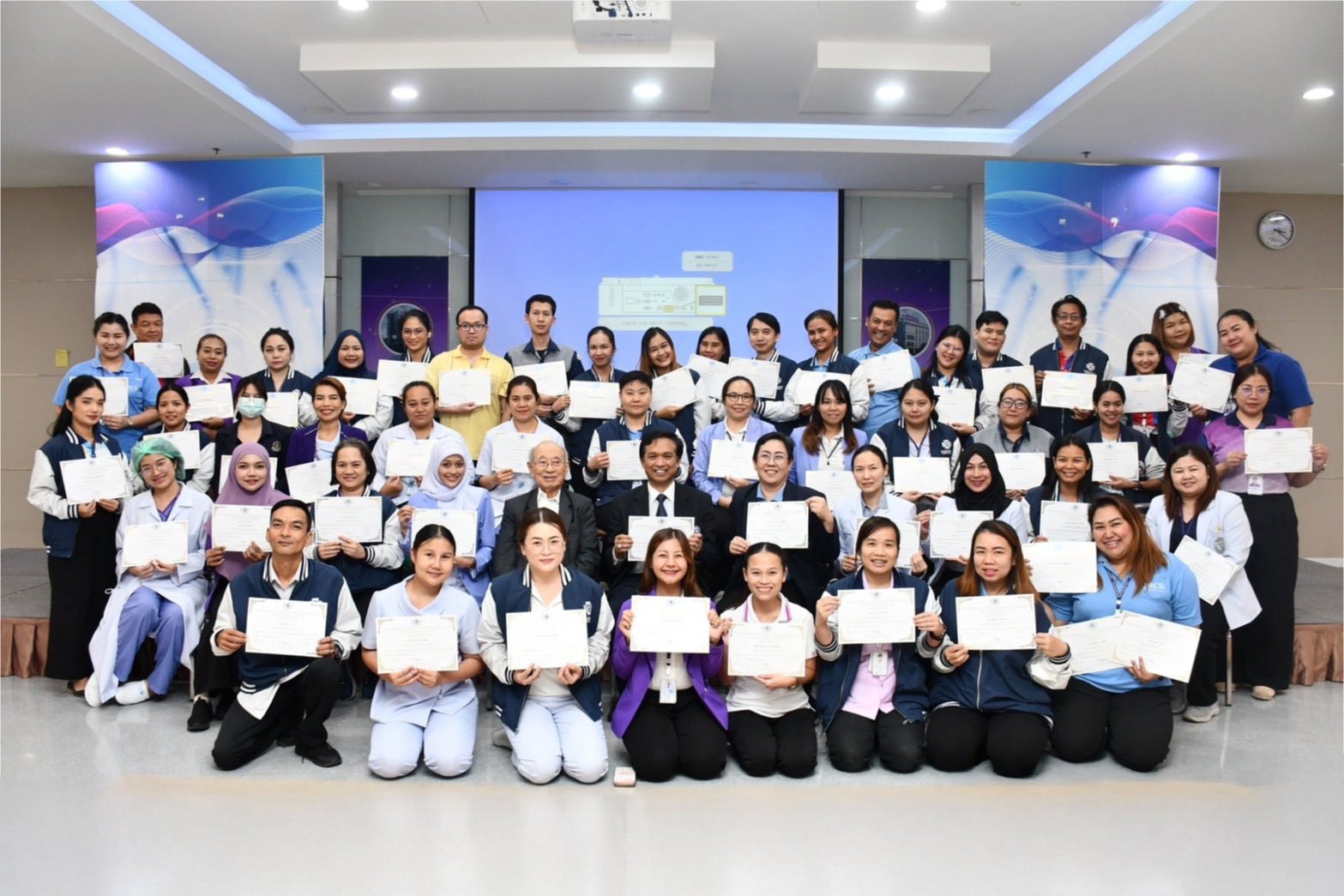
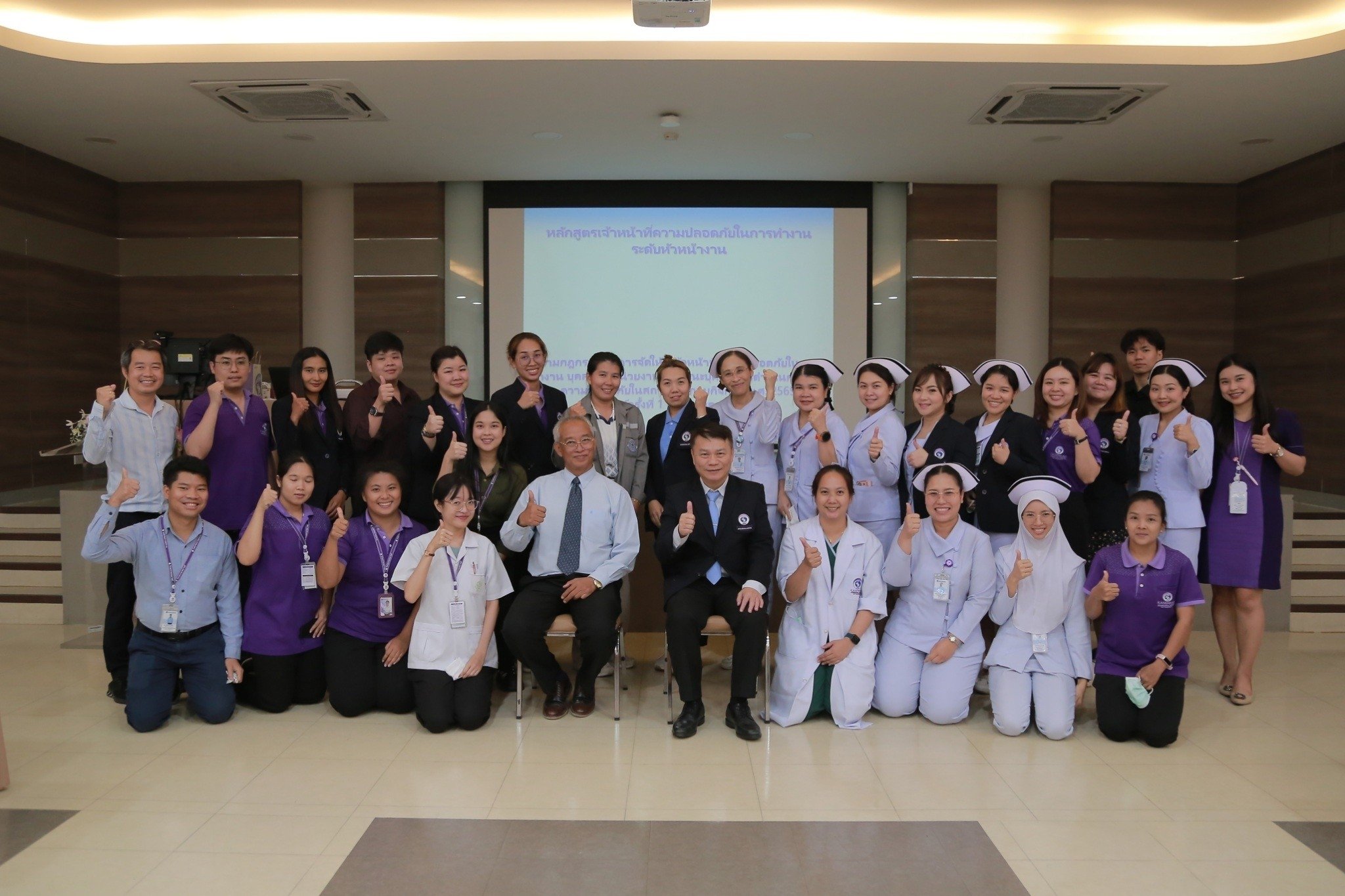
Human rights management
BCH places great importance on promoting and protecting human rights alongside conducting business ethically and transparently. It treats all stakeholders equally and without discrimination. The Company has established a Human Rights Policy based on international standards, including the Universal Declaration of Human Rights (UDHR), the United Nations Guiding Principles (UNGP), and the International Labour Organization (ILO) declarations. It also strictly complies with domestic human rights laws. The Sustainability Committee and Human Resources Department are assigned to assess human rights risks, prevent and manage complaints through grievance channels, and provide appropriate remediation.
Due to the nature of the Company’s business in the healthcare sector, which involves diverse stakeholders such as employees, customers, patients, and contractors, the company has prepared a comprehensive Human Rights Due Diligence (HRDD) report. The Company continuously assesses and discloses human rights issues that are significant to the business to mitigate risks of human rights violations throughout the value chain and to enhance the organization’s social responsibility.
Development and participation in the community
BCH recognizes its role in contributing to a strong and sustainable society by prioritizing social investment, both through company-initiated projects and collaborations with external organizations actively engaged in continuous social development. The focus is on initiatives aligned with the organization’s strategy, such as expanding healthcare services, promoting equitable access to medical care, and enhancing the quality of life for communities surrounding its facilities to create tangible positive social impacts. The Company encourages employee participation in social activities and volunteer work through internal support mechanisms and structures, while also promoting employment opportunities within local communities to foster sustainable economic growth. The CSR and Sustainability Teams, comprising marketing representatives from each hospital branch, coordinate with the Environmental Committee and hospital employees to organize regular volunteer and charitable activities, promoting active participation and engagement of staff in the Company’s social responsibility initiatives. These efforts not only reflect the Company’s social responsibility but also serve as a driving force in promoting community well-being and strengthening lasting bonds between the Company and society.
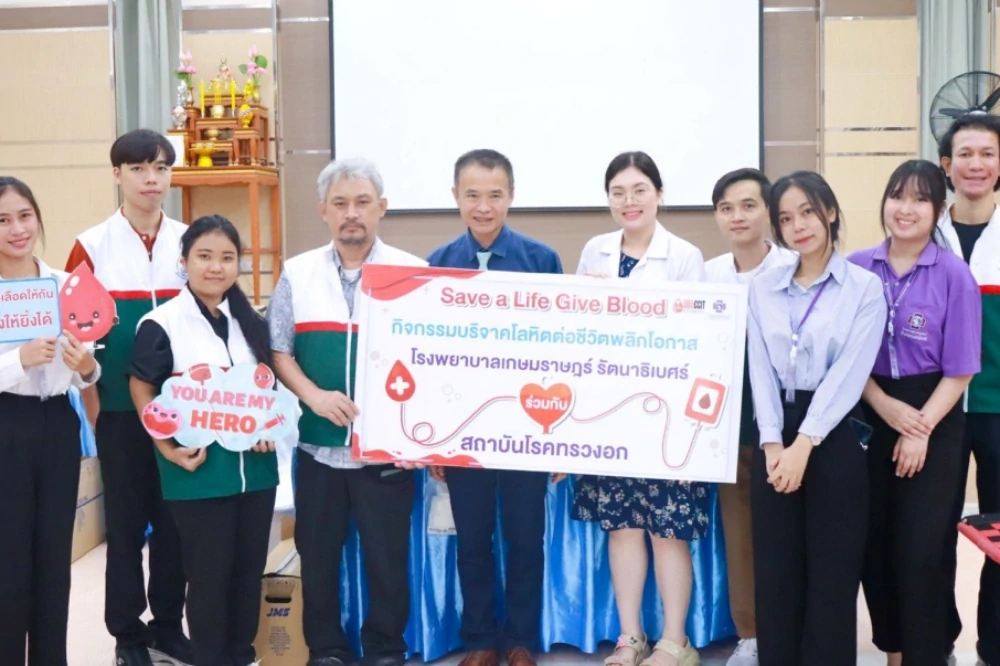
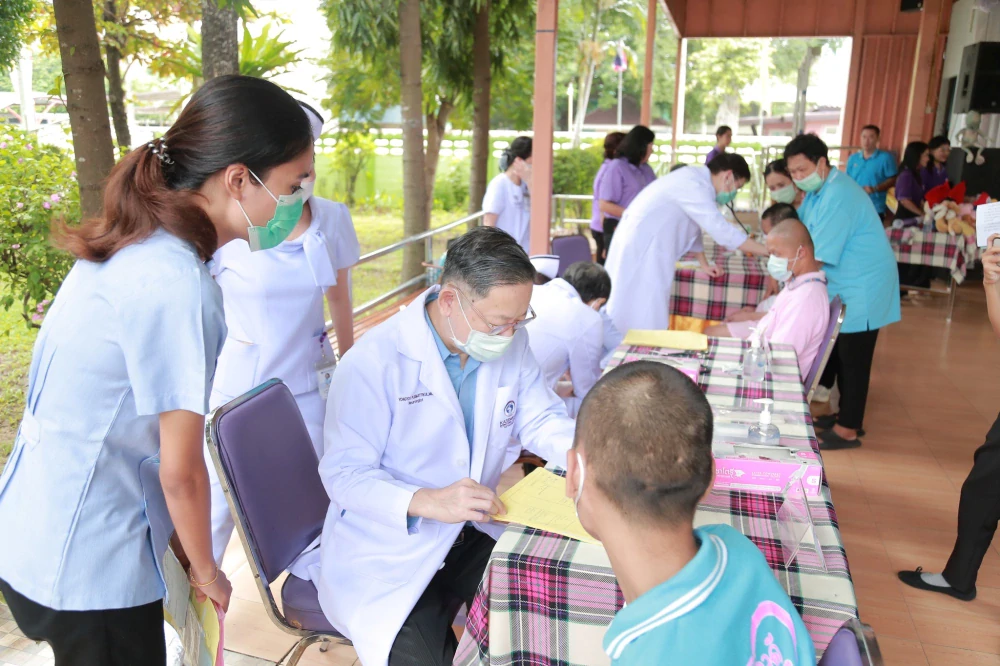
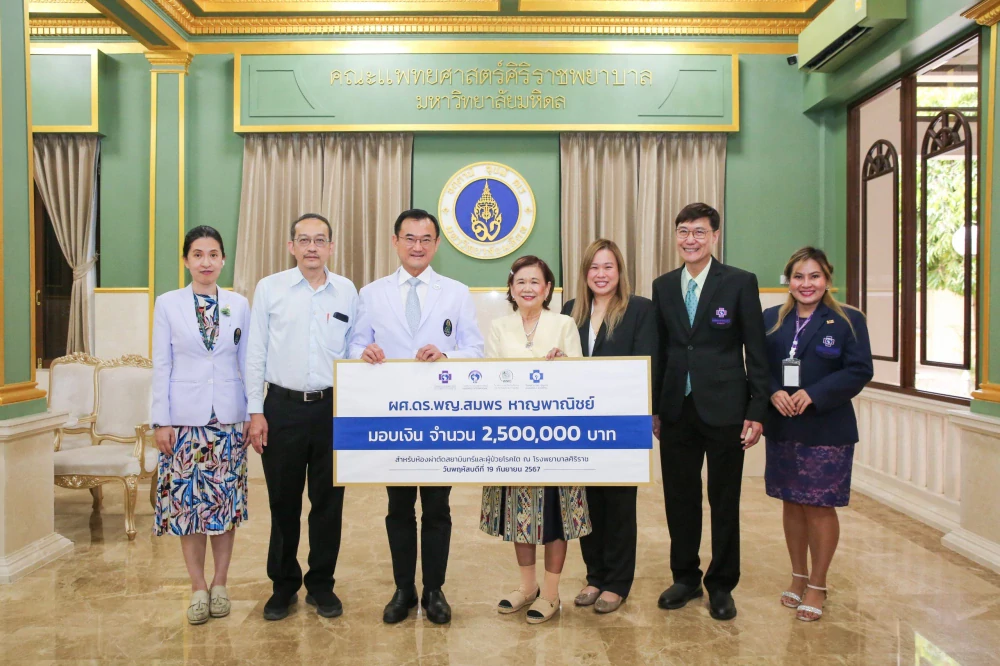
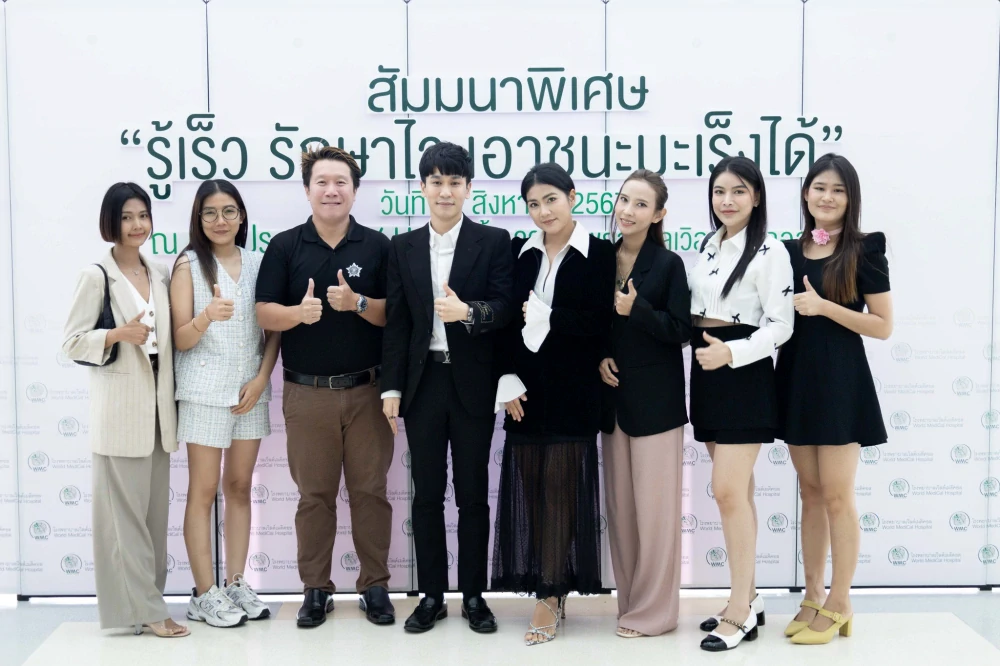
Ongoing Blood Donation Activities
In collaboration with the National Blood Service Center and the Thai Red Cross Society to support increasing blood reserves and alleviate blood shortages. The total volume of blood donated amounted to 554 cc.
Community Health Promotion Project with Mobile Health Screening Units
Mobile health screening and influenza vaccination units promote community health through regular disease screening and prevention. More than 157,480 people received health screening services, while over 800 individuals received 4-strain influenza vaccinations to reduce severe illnesses.
Donation Project of Goods and Financial Support for Assistance to Organizations
Donations of medical supplies, equipment, and financial contributions were provided throughout the year to various organizations. This included a 20,000-baht donation to Baan Nokkamin Foundation and 188,888 baht in support of scholarships, government agencies’ operations, and the preservation of Buddhism.
Health Education Activities
Over 100 projects were organized to enhance community health literacy. Specialist doctors and health experts provided knowledge, advice, and practical guidance on disease prevention and self-care.